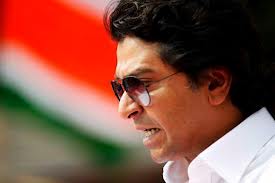 New Delhi, September 1: Raj Thackeray's comments threatening to brand Biharis as "infiltrators" have fuelled a controversy with leaders from various political parties slamming the MNS chief over the issue.
New Delhi, September 1: Raj Thackeray's comments threatening to brand Biharis as "infiltrators" have fuelled a controversy with leaders from various political parties slamming the MNS chief over the issue.
Congress general secretary Digvijaya Singh said the Thackeray family itself belonged to Bihar and had settled in Dhar in Western Madhya Pradesh from where they migrated to Mumbai.
"If you look at the history of Mumbai, then it is a city of fishermen. Rest all have settled there from outside," Singh said.
Thacekray had yesterday threatened to force Biharis out of Maharashtra if authorities in Bihar take legal action against Mumbai policemen who picked up a teenager from there without informing their counterparts in that state.
Thackeray, whose party has often launched violent campaigns against Hindi-speaking people in Maharashtra, was reacting to reports that Bihar chief secretary Navin Kumar has written to Mumbai police commissioner voicing displeasure over the arrest of the youth for vandalising the martyr's memorial during Azad Maidan protest on August 11.
Shivanand Tiwari, a senior leader of the ruling JD-U in Bihar, hit out at Congress over the issue suggesting that the ruling party at the Centre and in Maharashtra is propping up Thackeray and drew parallels with the rise of Jarnail Singh Bhindranwale in Punjab during the terror days there.
"This (the conduct of Raj Thackeray) is a challenge to the Constitutional authority. Thackeray says in Azad Maidan of Mumbai that the police commissioner should be transferred and it is done soon after. Does the Congress-led government in Maharashtra giving an impression that Thackeray bigger than the government there.
"I will request the Congress at the Centre as well as the Congress-led government in the state to learn from their experiences in Punjab, where they propped up Bhindranwale. They are creating extra Constitutional authorities and strengthening them. A time will come the same forces will destroy them like the demon Bhasmasur," Tewari said.





Comments
Add new comment